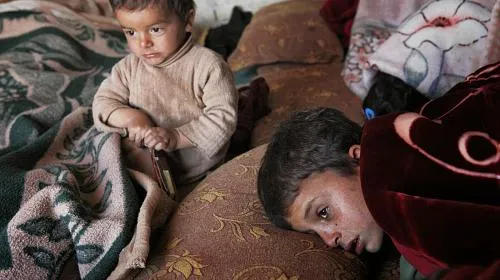Without further funding more and more Syrians could die of preventable and treatable diseases, warns CARE
Amman, 3 April 2014. Ahead of World Health Day (April 7) CARE International voices its concern about the deteriorating health situation of the almost 600,000 Syrian refugees living in Jordan. According to a recent assessment by CARE, Syrian refugees, living outside of camps in Jordan, are increasingly unable to cover expenses for medical treatment, in particular for chronic and other costly health conditions. “Refugees in Jordan are struggling to afford health care and medication. There are more and more cases where people die of diseases which are usually either preventable or treatable,” says Salam Kanaan, Country Director of CARE Jordan. Of the 384 families surveyed by CARE nine out of ten reported to have at least one family member with a medical condition, including chronic diseases, conflict related injuries and psychological problems.
The Government of Jordan, with the support of the international community, has made considerable efforts to expand health services to attend to the needs of Syrian refugees. Syrian families that are registered with the UN have access to basic health services. However according to CARE’s survey, 23% of Syrian refugees said they accessed private institutions, because the treatment they needed was not available from public services or there were no services in their area. Refugee families have to spend on average 90 USD per month for medical services and medication, a huge amount of money for families who have no or little means of income.
The average income found amongst Syrian refugee households is around 260 USD. “I have talked to a family whose little daughter has cancer. But they do not have money for her treatment. They cannot do anything but watch her slowly die. We have also had cases where family members had fallen in a diabetes coma simply because they could not afford to pay for their insulin injection,” says Kanaan. For women and girls it is particularly important to have access to maternal, sexual and reproductive health services.
High costs for medical care forces refugees to deplete their resources or sell assets, lowering their capacity to deal with future financial shocks. A lot of families borrow money or sell the little belongings they have left in order to cover medical expenses, making them dependent on neighbors, shop-owners and family and risking exploitation.
CARE has also found that the psychosocial wellbeing of refugee families due to the social and psychological impact of war is increasingly worrying. “The memories of war, the loss of family members and the constant struggle to survive have left scars on refugees’ hearts,” explains Kanaan. Especially families who have been displaced for a long time need help to cope with the experience of conflict, flight and displacement. One out of ten families said that they are very concerned about their psychological health and need support.
CARE calls on the international community to support the Government of Jordan to enhance and scale up health services for Syrian families and vulnerable host communities. “If the financial support for Syrian refugees remains as limited as it is now, the percentage of serious health conditions will rise even higher, especially with more and more refugees crossing the border to Jordan every day. Capacities of public health service providers need to be strengthened, so Syrian refugees and members of host communities can access the treatment that they need,” says Kanaan. “We cannot watch chronic diseases and severe medical conditions of thousands of refugees’ turn into acute medical emergencies. Additional support is required now.”
About CARE:
Founded in 1945, CARE is a leading humanitarian organization fighting global poverty and providing lifesaving assistance in emergencies. CARE places special focus on working alongside poor girls and women because, equipped with the proper resources, they have the power to help lift whole families and entire communities out of poverty. CARE has been working in Jordan since 1948. CARE Jordan has extensive experience working with refugees, providing livelihood training and opportunities, emergency cash assistance, information sharing and psychosocial support to Iraqi refugees since 2003.
Media Contacts:
Johanna Mitscherlich (Amman), Johanna.Mitscherlich@jo.care.org, +962 775442241

